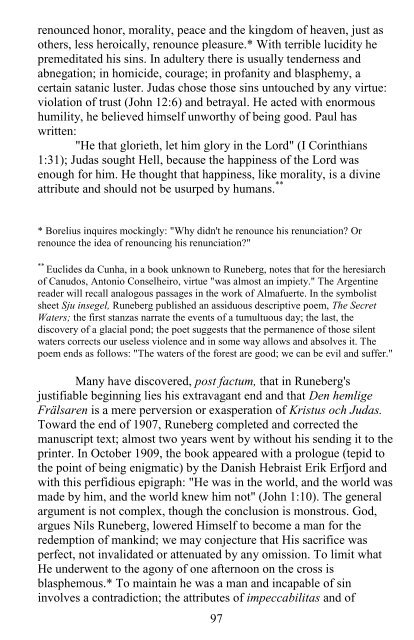Jorge Luis Borges - Labyrinths
Jorge Luis Borges - Labyrinths
Jorge Luis Borges - Labyrinths
You also want an ePaper? Increase the reach of your titles
YUMPU automatically turns print PDFs into web optimized ePapers that Google loves.
enounced honor, morality, peace and the kingdom of heaven, just as<br />
others, less heroically, renounce pleasure.* With terrible lucidity he<br />
premeditated his sins. In adultery there is usually tenderness and<br />
abnegation; in homicide, courage; in profanity and blasphemy, a<br />
certain satanic luster. Judas chose those sins untouched by any virtue:<br />
violation of trust (John 12:6) and betrayal. He acted with enormous<br />
humility, he believed himself unworthy of being good. Paul has<br />
written:<br />
"He that glorieth, let him glory in the Lord" (I Corinthians<br />
1:31); Judas sought Hell, because the happiness of the Lord was<br />
enough for him. He thought that happiness, like morality, is a divine<br />
attribute and should not be usurped by humans. **<br />
* Borelius inquires mockingly: "Why didn't he renounce his renunciation Or<br />
renounce the idea of renouncing his renunciation"<br />
**<br />
Euclides da Cunha, in a book unknown to Runeberg, notes that for the heresiarch<br />
of Canudos, Antonio Conselheiro, virtue "was almost an impiety." The Argentine<br />
reader will recall analogous passages in the work of Almafuerte. In the symbolist<br />
sheet Sju insegel, Runeberg published an assiduous descriptive poem, The Secret<br />
Waters; the first stanzas narrate the events of a tumultuous day; the last, the<br />
discovery of a glacial pond; the poet suggests that the permanence of those silent<br />
waters corrects our useless violence and in some way allows and absolves it. The<br />
poem ends as follows: "The waters of the forest are good; we can be evil and suffer."<br />
Many have discovered, post factum, that in Runeberg's<br />
justifiable beginning lies his extravagant end and that Den hemlige<br />
Frälsaren is a mere perversion or exasperation of Kristus och Judas.<br />
Toward the end of 1907, Runeberg completed and corrected the<br />
manuscript text; almost two years went by without his sending it to the<br />
printer. In October 1909, the book appeared with a prologue (tepid to<br />
the point of being enigmatic) by the Danish Hebraist Erik Erfjord and<br />
with this perfidious epigraph: "He was in the world, and the world was<br />
made by him, and the world knew him not" (John 1:10). The general<br />
argument is not complex, though the conclusion is monstrous. God,<br />
argues Nils Runeberg, lowered Himself to become a man for the<br />
redemption of mankind; we may conjecture that His sacrifice was<br />
perfect, not invalidated or attenuated by any omission. To limit what<br />
He underwent to the agony of one afternoon on the cross is<br />
blasphemous.* To maintain he was a man and incapable of sin<br />
involves a contradiction; the attributes of impeccabilitas and of<br />
97


